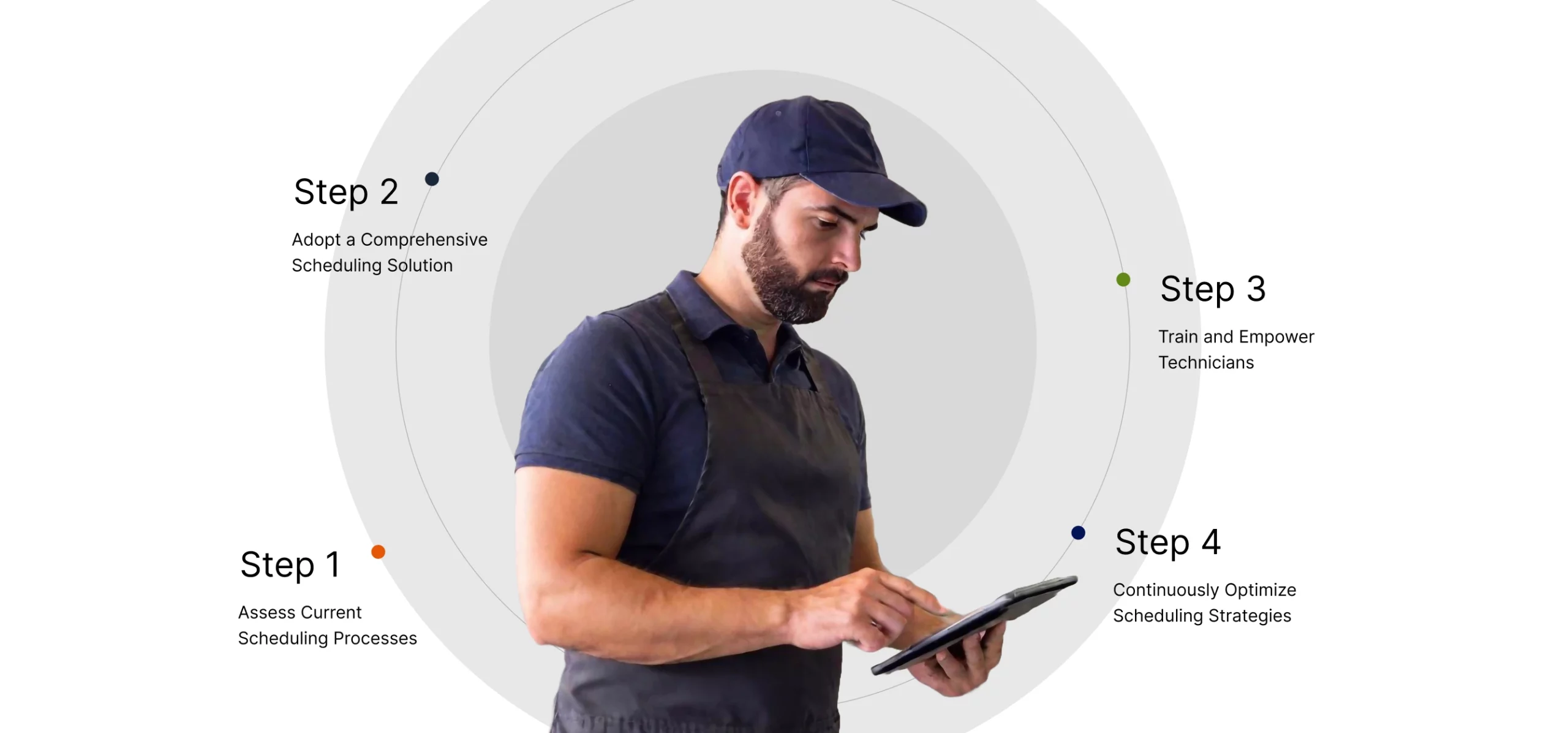- Sales Process Management
How automation improves field service efficiency
Efficient technician scheduling is critical to delivering superior service quality. Poor scheduling leads to delays, dissatisfied customers, and increased operational costs. Businesses need an intelligent approach to optimize workforce efficiency and enhance customer experience.
Modern systems enable businesses to streamline operations and maximize productivity. Companies adopting advanced solutions see improved first-time fix rates and increased customer satisfaction. Smart scheduling reduces downtime, minimizes travel costs, and ensures optimal resource utilization.
In today’s competitive market, service organizations must embrace automation and data-driven scheduling. A technician scheduling app provides real-time updates, ensuring seamless coordination. This blog explores why smart technician scheduling is essential and how it transforms service delivery.
Many service organizations struggle with inefficient scheduling processes. Manual scheduling leads to errors, double bookings, and underutilized resources. Companies relying on outdated methods experience lower productivity and missed service level agreements (SLAs).
Technicians often face inefficient routing, increasing travel time and reducing service calls per day. Poor communication further complicates the process, resulting in customer dissatisfaction and operational inefficiencies. Without automation, service dispatchers lack visibility into technician availability and skillsets.
Businesses need a dynamic system to address these inefficiencies. A technician scheduling software solution provides real-time visibility, automates job assignments, and optimizes workforce management.
By leveraging automation and real-time data, businesses can optimize workforce management, reduce costs, and enhance overall service quality.
This section explores the impact of smart technician scheduling on service efficiency and customer satisfaction.
Smart scheduling assigns tasks based on technician skills, location, and availability. This ensures the right technician reaches the job site on time. Businesses can improve service efficiency by leveraging data-driven insights.
A technician scheduling app helps field service managers assign work dynamically. AI-driven algorithms match technicians with jobs, reducing idle time and enhancing workforce utilization. The result is faster response times and improved customer satisfaction.
Inefficient routing increases fuel costs and travel time. Smart scheduling minimizes unnecessary travel by optimizing technician routes. GPS-enabled scheduling software ensures technicians take the fastest and most cost-effective routes.
Companies using technician scheduling software reduce transportation expenses and increase the number of daily service calls. Fewer delays lead to improved service quality and stronger customer trust.
Sending the right technician with the necessary skills and tools improves first-time fix rates. Smart scheduling systems analyze historical job data and technician expertise to make informed dispatch decisions.
Technicians equipped with relevant job details, manuals, and diagnostics arrive prepared. This eliminates unnecessary return visits and enhances service efficiency. Customers receive prompt resolutions, leading to higher retention rates and positive brand perception.
Customers expect timely and efficient service. Delayed or missed appointments damage brand reputation and impact customer loyalty. Smart technician scheduling ensures prompt arrivals and reduces wait times.
Technician scheduling software offers automated reminders and real-time tracking, enhancing customer communication. Transparent organization fosters trust and improves customer engagement. Personalized service builds long-term relationships and drives repeat business.
AI-powered scheduling optimizes technician assignments using predictive analytics. Machine learning algorithms analyze historical data to improve scheduling accuracy. Businesses leveraging AI-driven technician scheduling software gain a competitive edge.
Modern technology enables proactive service scheduling. Smart devices detect potential issues, triggering automatic technician dispatch. Predictive maintenance minimizes downtime and enhances service efficiency.

By assessing current processes, adopting advanced scheduling solutions, training technicians, and continuously optimizing strategies, companies can enhance efficiency, reduce costs, and improve service quality.
This section explores a step-by-step approach to implementing smart technician scheduling for business success.
Evaluate existing scheduling inefficiencies and identify areas for improvement. Analyze service data, technician performance, and customer feedback.
Invest in AI-driven technician scheduling software. Choose a solution with automation, real-time updates, and predictive analytics capabilities.
Provide technicians with access to scheduling apps and training. Digital tools enhance efficiency, reduce errors, and improve job completion rates.
Monitor scheduling performance using key metrics. Adjust strategies based on real-time insights to maximize efficiency and service quality.
Smart technician scheduling is essential for delivering superior service quality. Businesses leveraging automation and AI-driven solutions see increased efficiency, reduced costs, and improved customer satisfaction.
Technician scheduling software optimizes workforce allocation, reduces travel time, and enhances first-time fix rates. Real-time arrangements improve communication and responsiveness. Adopting a technician scheduling app future-proofs service operations and ensures business growth.
Businesses must embrace modern strategies to remain competitive. Investing in intelligent technician scheduling solutions drives operational excellence and strengthens customer relationships.
Optimize your existing process today. Invest in smart scheduling solutions and transform your service operations.